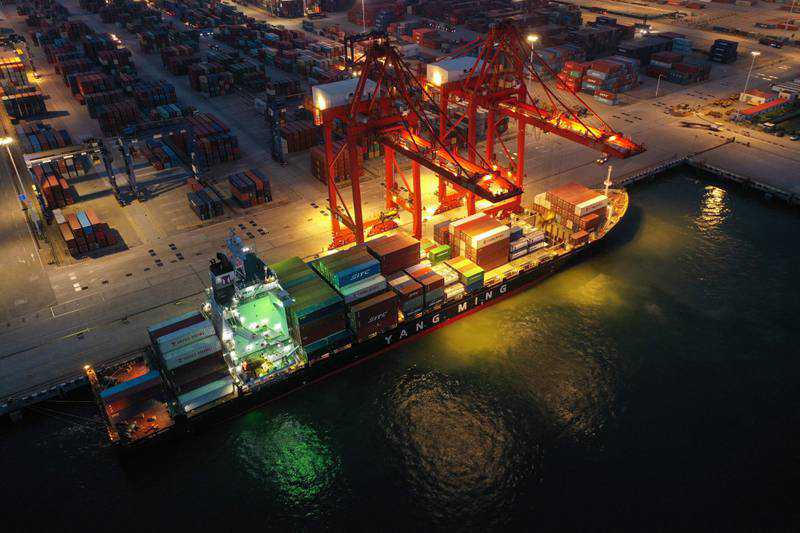Global trade jumped 25% to record $28.5tn in 2021, Unctad says

Global trade increased an annual 25 per cent last year to a record $28.5 trillion after being battered by the Covid-19 pandemic, a report from the UN Conference on Trade and Development has shown. It increased about 13 per cent compared from 2019, the agency said in its Global Trade Update report, released on Thursday. Trade volume in both goods and services divisions followed similar growth patterns last year.
During the fourth quarter of last year, trade in goods reached about $5.8tn — a new quarterly record. During the same three-month period, trade in services hit $1.6tn, slightly above pre-pandemic levels. The positive trend for trade was primarily the result of an increase in “commodity prices, subsiding pandemic restrictions and a strong recovery in demand due to economic stimulus packages”.
Last month, the International Monetary Fund cut its world economic growth forecast for 2022 by 0.5 percentage points to 4.4 per cent because of rising inflation, supply chain disruptions, the Covid-19 Omicron variant and concerns related to the China’s real estate sector. On Wednesday, the fund said global growth had slowed since it issued its updated forecast in January.
Global trade patterns are expected to reflect these macroeconomic trends in 2022, with lower-than-expected trade growth, Unctad said. In the past months, the Covid-19 crisis has exacerbated supply chain bottlenecks and highlighted significant challenges in the logistics sector, with many cargo customers struggling to find shipping containers and overcome labour disruptions.
Acute supply chain blockages have led to congestion and delays at ports, a shortage in containers and a sharp rise in the cost of shipping goods. Rising energy prices have further contributed to supply shortages and spiralling shipping costs.
The UN agency said that businesses’ efforts to improve supply chains and diversify their supplier base could also affect global trade patterns. “Major companies have become strongly focused on improving reliability and managing risks for their supply networks, but delays have persisted nevertheless,” it said.
This year’s trade trends are also predicted to reflect the growing demand for products that are sustainable. “Such patterns may also be supported by government policies regulating the trade of high-carbon products,” Unctad said.
“Moreover, global trade patterns could also be influenced by increased demand of strategic commodities required to support greener energy alternatives [such as cobalt, lithium and rare earth metals]."
Concerns about debt sustainability are likely to intensify in the coming quarters due to mounting inflationary pressure and it could potentially affect global trade in 2022. “A significant tightening of financial conditions would heighten pressure on the most highly indebted governments, amplifying vulnerabilities and negatively affecting investments and international trade flow,” the agency said.
It predicted that regionalisation of trade flows would increase in the coming months. For example, the Regional Comprehensive Economic Partnership, which was enforced on January 1, enables trade among many of the East Asian and Pacific economies. It is expected to increase trade between members and divert trade from the non-member countries, Unctad said.
The regionalisation of trade flows is also expected to increase in other parts of the world in line with other regional initiatives — like the African Continental Free Trade Area — and due to an increasing reliance of geographically closer suppliers, it said.
Developing countries outperformed rich nations in trade, with exports from developing markets in the last quarter about 30 per cent higher on an annual basis, according to the UN agency. In developed economies, it was 15 per cent higher. Moreover, trade growth between developing countries outpaced global trade in the fourth quarter, with a yearly increase of about 32 per cent.
Unctad found, with the exception of the transport equipment industry, all economic sectors experienced a year-on-year increase in the value of their trade in the last quarter. Due to the Covid-induced shortage of semiconductors, trade growth in communication equipment, road vehicles and precision instruments was slightly subdued in the previous quarter.
Previous Story
- UK launches talks with India over free-trade agreement
- UK steel makers 'left behind' as US ends...
- ‘Expat Bangladeshis in Spain contribute massively to EU...
- USDA launches $27m trade facilitation project for Bangladesh
- Bangladesh trade, investment virtual summit from October 26
- Successful in cross-border e-commerce with the right partner
- ‘Bangladesh has opportunity to remain a force in...
- Exports to Bhutan go up as trade agreement...